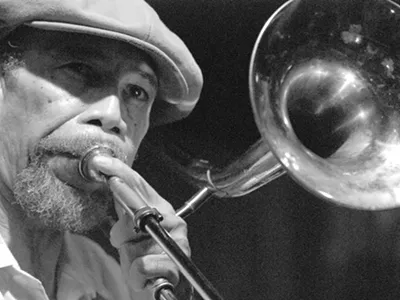Since then, the Fannies have had a slow but steady output of new material — their last album was Shadows, released in 2010 — but Here perhaps marks the biggest departure from the feedback-driven sound of their earlier work. The songs still vibrate with layered sounds, harmonies, and the catchy hooks that so closely linked them to power-pop predecessors Big Star, but the vocals and rounded guitar riffs are more upfront and folk-tinged than ever, subtly anchored by an undercurrent of string arrangements that give the entire album a warmth that sort of seeps in and takes hold of you from start to finish.
When we caught frontman and guitarist Norman Blake, he was taking a break from some pre-tour errands at his parents' house in Glasgow, and was happy to give us more insight to the creative process.
"Well it's kind of ironic it's called Here, because it was recorded and mixed in several different places, but the initial recording was done in the south of France, which Raymond from the band found, a place called Studio Vega," Blake says. "We went there partly because of the equipment that they have — they have a lovely old EMI desk, the kind of desk that the Beatles recorded on, a proper old sort of vintage desk, and also because we always love to leave Glasgow when we're making a record. We like the idea that it's an event, and also we like the wine and cheese from the south of France!"
While most of the initial recording was done at Studio Vega, the band reconvened at Raymond's house in Glasgow to track the vocals, and then met again many months later to mix the record in Hamburg, each time reassessing and fine-tuning their work.
And despite the segmented process, the tracks are incredibly cohesive lyrically, due mainly to the fact that the quintet, according to Blake, find the words through a collaborative effort.
"We kind of write the lyrics as we go along, so we take turns recording them and singing, but at the same time the others are writing, so we kind of influence each other," Blake says. "Maybe if there are similar themes in terms of the songwriting, that's because we're sort of picking up ideas from each other."
Songs like the first single, "I'm in Love," and other stand-out tracks such as "Thin Air," "The First Sight," and "The Darkest Part of The Night" indeed all explore feelings on the love spectrum, at times longing and wistful, then shifting at other times to euphoria or contentment and gratitude. Here seems to be the group's poignant statement about life being ephemeral, and the urgency to be present in every moment.
Speaking personally, Blake says he can only ever try and be honest. "I've never been the kind of person who can take a newspaper headline, extrapolate on that, and create a narrative," he says. "The only thing I really know about and have experience of is my life and the way I experience the world, and my relationships. I like to write about myself, as terrible as that sounds." But self-truths never sound too terrible in the kind of earnest love songs the Fannies seems to craft so effortlessly. The simplicity and straightforwardness of Here seems to gesture at a wisdom about the art of songwriting that only arrives when you've been a band for as long as they have, a point Blake pokes fun at, mentioning that he and Bobby Gillespie (Primal Scream, Jesus & Mary Chain) once kidded each other backstage at a festival in Glasgow about trying to hang on in a "young man's game."
Blake's self-deprecating humor is especially charming when you consider Teenage Fanclub's place in the legendary music scene of 1980s Glasgow, which also birthed the likes of friends and contemporaries the Pastels and the Vaselines, as well as many other indie pop acts that followed suit in the advent of the short-lived but impactful Postcard Records. Postcard's roster included post-punk acts like Orange Juice and Josef K., who in particular inspired Glasgow youth with their venturesome and innovative interpretations of '60s Americana and Motown soul. Even the label's slogan, "The Sound of Young Scotland," was itself a play on Motown label Tamla, which founder Berry Gordy referred to as "The Sound of Young America." But Blake views this piece of music history as a small part in the larger tradition of bands reaching back to the past, and points out that Glasgow, much like Detroit, is still very much a music city, perhaps now more than ever. "Of course Glasgow being the biggest city, it's going to be the focal point But the other thing is, we have the best art school in the U.K.," he says.
"And actually, a lot of our contemporaries, friends of ours from back in the day, that have been very successful, have been guys that have come through the Glasgow School of Art. And so I think wherever you have a good art school, you're going to have a music scene, because of course artists and musicians are interchangeable. And it's still continuing, with Mogwai, Chvrches, and even more [bands] recently. There will always be different music and bands coming from Glasgow. It's now regarded globally as a great music city, which it is, you know. It's amazing."
Blake lives in Kitchener, Ontario, with his wife, about a three-hour drive east of Detroit, but whenever he visits home, he makes sure to stop by Monorail, Stephen McRobbie's — of the Pastels — record store. "I saw just him today! Yeah, that's an amazing store, it's again one of the best record stores in the U.K. But it's actually great because, so Monorail is there, but it's connected to Mono, which is a kind of bar/venue, so you can go and like, buy some records, go have a beer, listen to music, chill out. It's really really good. And you know I think a lot of the bands will go there just to hang out and buy records. I actually played bass on a Pastels tour of Europe. I think it was 29 years ago now. Stephen's been a friend for a long long time."
It's safe to say Blake is a musician's musician, becoming especially animated when talking about new bands he is following closely, like the London psych-duo Ultimate Painting, revisiting the Kink's Preservation Act 1, or else the recent passing of British songwriting legend Rod Temperton, most famous for writing Michael Jackson's "Thriller" and many other megahits.
And in respect to Here, which recently debuted on multiple Billboard charts in the U.K., Blake feels grateful. "We're lucky in that we've been around for a long time, and we have a fan base, people who will always buy our records, and we can still just about get by," he says. "But yes, for a new band or a younger band, it's very difficult. No one buys records anymore."
The Fannies will never be a self-celebratory band, and are known for emphasizing their new material on tour, rather than a retrospective trip down memory lane.
"All we ever strive to do when we make an album is write a better batch of songs than we did last time," Blake says. "I think that's all you do as a songwriter, you're always trying to better and improve on what you've done before." It is this spirit of continuing on that imbues Here in its entirety, and will keep their "fannies" intrigued for a long time to come.
Teenage Fanclub plays the Loving Touch on Tuesday, Oct. 25; Doors at 8 p.m.; 22634 Woodward Ave., Ferndale; 248-820-5596; tickets are $20 advance/$22 day of, all ages.






